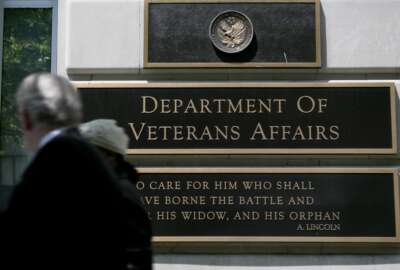- Lawmakers are closing ranks on a bipartisan bill to fix the Department of Veterans Affairs troubled rollout of a new Electronic Health Record. House VA Committee Chairman Mike Bost (R-Ill.) and Ranking Member Mark Takano (D-Calif.) are introducing companion legislation to the EHR Program RESET Act led by Senate Democrats. The bill would prevent the VA from proceeding with the rollout of its new Oracle-Cerner EHR until data from the five current sites already using the system show improvement. The bill is led by Senate VA Committee Chairman Jon Tester (D-Mont.) and Sens. Patty Murray (D-Wash.) and Sherrod Brown (D-Ohio).
- The Defense Health Agency reaffirmed the award of the TRICARE western region managed-care support contract to TriWest Health Alliance on Thursday. After the award in December, losing bidder Health Net Federal Services filed a protest asking DHA to reconsider. DHA upheld the award. Health Net still has an opportunity to protest the award through the Government Accountability Office or the Court of Federal Claims. DHA awarded two managed-care support contracts, one for the western region and one for the eastern region. Humana Government Business got the contract for the eastern region.
- Governmentwide challenges are slowing progress on the Government Accountability Office's high-risk list. Cybersecurity and strategic human capital management remain major risks for federal agencies. Both have been on GAO's list of troubled federal programs for more than 20 years. The latest addition to the list is the Federal Bureau of Prisons, where staffing and management have remained long-standing issues. Despite the challenges, agencies made more headway than usual. Overall, 16 of the 37 items on GAO's high-risk list improved, including health care at the Department of Veterans Affairs and the Postal Service.
- Confusion about drug policies may be preventing younger people from sparking up a career in national security. Many 18-to-30 year olds have misconceptions about the government’s policies around prior marijuana use and security-clearance eligibility. That is according to the results of a survey published by ClearanceJobs yesterday. Nearly a quarter of all respondents incorrectly said that prior cannabis use would prevent them from getting a clearance. Current federal policy advises agencies to consider previous marijuana use as one factor, but not the sole disqualifying reason in deciding whether to grant a clearance.
- The Secret Service will be getting a familiar face to serve as its new Number Two. The agency announced that Ronald Rowe Jr. will start serving as its deputy director in the coming months. Rowe served alongside current Secret Service Director Kimberly Cheatle in a previous capacity. Rowe's experience at the Secret Service dates back to 1999. He's worked as chief of staff to former Director James M. Murray and as the Deputy Assistant Director of the Office of Protective Operations. Rowe will replace outgoing Deputy Director Faron Paramore, who is retiring after more than three decades at the Secret Service.
- Agencies have new tips to try to strengthen their anti-harassment programs. The Equal Employment Opportunity Commission's list of best practices includes, for example, creating and distributing an annual anti-harassment policy statement in the federal workplace. Agencies' anti-harassment programs should include neutral staff members, who can act quickly on harassment allegations. Supervisors and managers should also create and monitor ways to prevent online harassment, including in remote work environments, according to the EEOC.
- The Postal Service’s regulator is reviewing the agency’s plans to consolidate its delivery network. The Postal Regulatory Commission is launching a public-inquiry proceeding on USPS plans to bring mail processing and delivery operations under one roof. USPS opened its first one-stop-shop Sorting and Delivery Center in Athens, Georgia in November 2022. The Postal Regulatory Commission is launching its inquiry to better understand how the Sorting and Delivery Centers will impact USPS costs and performance.
- Guidelines developed by the staff of the U.S. Embassy in Rome to promote sustainable acquisition will now be used throughout the State Department. The staff came up with a roadmap for using vendors with eco-friendly certifications, mandates for low emissions and low waste disposal and recycling plans. Agencies across the federal government have plans in the works to put value on sustainability for acquisition purposes including using alternative fuel sources and green building practices. New training programs will teach acquisition officers how to develop requirements for sustainable procurement.
Copyright
© 2025 Federal News Network. All rights reserved. This website is not intended for users located within the European Economic Area.





